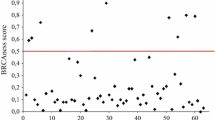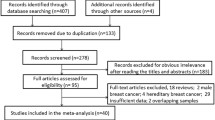Abstract
Paraffin sections from 239 cases of surgical resected mammary gland carcinomas were assessed to determine the role of BRCA1 gene methylation in sporadic triple-negative breast cancer and to evaluate the relationship between BRCA1 gene methylation and clinicopathologic features of triple-negative breast cancer in the National Cancer Center, China. Diagnostic tissues collected from patients received mastectomy in the National Cancer Center from January 1, 1999 to December 31, 2008 were reviewed. Tissue microarrays were constructed using 239 triple-negative breast cancer cases and stained with estrogen receptor, progesterone receptor, human epidermal growth factor receptor 2, cytokeratin 5/6, and epidermal growth factor receptor. Methylation status of the BRCA1 promoter was measured by methylation-specific PCR and analyzed against clinicopathologic characteristics, subtypes, and prognosis using standard statistical methods. Among the 239 triple-negative breast cancer cases, 137 (57.3 %) showed methylation of the BRCA1. According to the immunohistochemistry results, triple-negative breast cancer cases were classified into basal-like breast cancer (60.7 %) and non-basal-like breast cancer (39.3 %). The frequency of BRCA1 methylation was significantly higher in basal-like breast cancer subtype (71.7 %) than the non-basal subtype (35.1 %). Thus, BRCA1 methylation is statistically significantly correlated with basal-like breast cancer subtype (p < 0.001). Multivariate analyses further showed that BRCA1 promoter methylation is an independently predictor of overall survival (p = 0.023; HR 2.32; 95 % CI 1.12–4.81) and disease-free survival (p = 0.022; HR 2.36; 95 % CI 1.13–4.90) in triple-negative breast cancer. Here we demonstrated that epigenetic alteration of key tumor suppressor gene can be a promising biomarker for the prognosis of triple-negative breast cancer/basal-like breast cancer. Specifically our finding revealed that BRCA1 methylation is closely associated with a significant decrease in overall survival and disease-free survival, highlighting BRCA1 promoter methylation as promising and powerful biomarkers for effect and better prognosis of DNA damaging agents for triple-negative breast cancer/basal-like breast cancer.



Similar content being viewed by others
References
Siegel R, Ma J, Zou Z, Jemal A (2014) Cancer statistics, 2014. CA Cancer J Clin 64(1):9–29
Blows FM, Driver KE, Schmidt MK, Broeks A, van Leeuwen FE, Wesseling J, Cheang MC, Gelmon K, Nielsen TO, Blomqvist C et al (2010) Subtyping of breast cancer by immunohistochemistry to investigate a relationship between subtype and short and long term survival: a collaborative analysis of data for 10,159 cases from 12 studies. PLoS Med 7(5):e1000279
Foulkes WD, Smith IE, Reis-Filho JS (2010) Triple-negative breast cancer. N Engl J Med 363(20):1938–1948
Xu Y, Diao L, Chen Y, Liu Y, Wang C, Ouyang T, Li J, Wang T, Fan Z, Fan T et al (2013) Promoter methylation of BRCA1 in triple-negative breast cancer predicts sensitivity to adjuvant chemotherapy. Ann Oncol 24(6):1498–1505
Nielsen TO, Hsu FD, Jensen K, Cheang M, Karaca G, Hu Z, Hernandez-Boussard T, Livasy C, Cowan D, Dressler L et al (2004) Immunohistochemical and clinical characterization of the basal-like subtype of invasive breast carcinoma. Clin Cancer Res 10(16):5367–5374
Kim MJ, Ro JY, Ahn SH, Kim HH, Kim SB, Gong G (2006) Clinicopathologic significance of the basal-like subtype of breast cancer: a comparison with hormone receptor and Her2/neu-overexpressing phenotypes. Hum Pathol 37(9):1217–1226
Banerjee S, Reis-Filho JS, Ashley S, Steele D, Ashworth A, Lakhani SR, Smith IE (2006) Basal-like breast carcinomas: clinical outcome and response to chemotherapy. J Clin Pathol 59(7):729–735
Kennedy RD, Quinn JE, Johnston PG, Harkin DP (2002) BRCA1: mechanisms of inactivation and implications for management of patients. Lancet 360(9338):1007–1014
Lips EH, Mulder L, Oonk A, van der Kolk LE, Hogervorst FB, Imholz AL, Wesseling J, Rodenhuis S, Nederlof PM (2013) Triple-negative breast cancer: BRCAness and concordance of clinical features with BRCA1-mutation carriers. Br J Cancer 108(10):2172–2177
Peshkin BN, Alabek ML, Isaacs C (2010) BRCA1/2 mutations and triple negative breast cancers. Breast Dis 32(1–2):25–33
Gacem RB, Hachana M, Ziadi S, Amara K, Ksia F, Mokni M, Trimeche M (2012) Contribution of epigenetic alteration of BRCA1 and BRCA2 genes in breast carcinomas in Tunisian patients. Cancer Epidemiol 36(2):190–197
Kriege M, Seynaeve C, Meijers-Heijboer H, Collee JM, Menke-Pluymers MB, Bartels CC, Tilanus-Linthorst MM, Blom J, Huijskens E, Jager A et al (2009) Sensitivity to first-line chemotherapy for metastatic breast cancer in BRCA1 and BRCA2 mutation carriers. J Clin Oncol 27(23):3764–3771
Fong PC, Boss DS, Yap TA, Tutt A, Wu P, Mergui-Roelvink M, Mortimer P, Swaisland H, Lau A, O’Connor MJ et al (2009) Inhibition of poly(ADP-ribose) polymerase in tumors from BRCA mutation carriers. N Engl J Med 361(2):123–134
Ignatov T, Poehlmann A, Ignatov A, Schinlauer A, Costa SD, Roessner A, Kalinski T, Bischoff J (2013) BRCA1 promoter methylation is a marker of better response to anthracycline-based therapy in sporadic TNBC. Breast Cancer Res Treat 141(2):205–212
Joosse SA, Brandwijk KI, Mulder L, Wesseling J, Hannemann J, Nederlof PM (2011) Genomic signature of BRCA1 deficiency in sporadic basal-like breast tumors. Genes Chromosomes Cancer 50(2):71–81
Jones PA, Baylin SB (2002) The fundamental role of epigenetic events in cancer. Nat Rev Genet 3(6):415–428
Sharma P, Stecklein SR, Kimler BF, Sethi G, Petroff BK, Phillips TA, Tawfik OW, Godwin AK, Jensen RA (2014) The prognostic value of promoter methylation in early stage triple negative breast cancer. J Cancer Ther Res 3(2):1–11
Esteller M, Silva JM, Dominguez G, Bonilla F, Matias-Guiu X, Lerma E, Bussaglia E, Prat J, Harkes IC, Repasky EA et al (2000) Promoter hypermethylation and BRCA1 inactivation in sporadic breast and ovarian tumors. J Natl Cancer Inst 92(7):564–569
Bal A, Verma S, Joshi K, Singla A, Thakur R, Arora S, Singh G (2012) BRCA1-methylated sporadic breast cancers are BRCA-like in showing a basal phenotype and absence of ER expression. Virchows Arch 461(3):305–312
Foulkes WD, Stefansson IM, Chappuis PO, Begin LR, Goffin JR, Wong N, Trudel M, Akslen LA (2003) Germline BRCA1 mutations and a basal epithelial phenotype in breast cancer. J Natl Cancer Inst 95(19):1482–1485
Pang D, Zhao Y, Xue W, Shan M, Chen Y, Zhang Y, Zhang G, Liu F, Li D, Yang Y (2012) Methylation profiles of the BRCA1 promoter in hereditary and sporadic breast cancer among Han Chinese. Med Oncol 29(3):1561–1568
Palacios J, Honrado E, Cigudosa JC, Benitez J (2005) ERBB2 and MYC alterations in BRCA1- and BRCA2-associated cancers. Genes Chromosomes Cancer 42(2):204–205 author reply 206
Singh AK, Pandey A, Tewari M, Shukla HS, Pandey HP (2011) Epigenetic silencing of BRCA1 gene associated with demographic and pathologic factors in sporadic breast cancer: a study of an Indian population. Eur J Cancer Prev 20(6):478–483
Xu X, Gammon MD, Zhang Y, Bestor TH, Zeisel SH, Wetmur JG, Wallenstein S, Bradshaw PT, Garbowski G, Teitelbaum SL et al (2009) BRCA1 promoter methylation is associated with increased mortality among women with breast cancer. Breast Cancer Res Treat 115(2):397–404
Wu L, Wang F, Xu R, Zhang S, Peng X, Feng Y, Wang J, Lu C (2013) Promoter methylation of BRCA1 in the prognosis of breast cancer: a meta-analysis. Breast Cancer Res Treat 142(3):619–627
Santarosa M, Maestro R (2012) BRACking news on triple-negative/basal-like breast cancers: how BRCA1 deficiency may result in the development of a selective tumor subtype. Cancer Metastasis Rev 31(1–2):131–142
Perou CM, Sorlie T, Eisen MB, van de Rijn M, Jeffrey SS, Rees CA, Pollack JR, Ross DT, Johnsen H, Akslen LA et al (2000) Molecular portraits of human breast tumours. Nature 406(6797):747–752
Livasy CA, Karaca G, Nanda R, Tretiakova MS, Olopade OI, Moore DT, Perou CM (2006) Phenotypic evaluation of the basal-like subtype of invasive breast carcinoma. Mod Pathol 19(2):264–271
Drew Y, Mulligan EA, Vong WT, Thomas HD, Kahn S, Kyle S, Mukhopadhyay A, Los G, Hostomsky Z, Plummer ER et al (2011) Therapeutic potential of poly(ADP-ribose) polymerase inhibitor AG014699 in human cancers with mutated or methylated BRCA1 or BRCA2. J Natl Cancer Inst 103(4):334–346
Kaelin WG Jr (2005) The concept of synthetic lethality in the context of anticancer therapy. Nat Rev Cancer 5(9):689–698
Samouelian V, Maugard CM, Jolicoeur M, Bertrand R, Arcand SL, Tonin PN, Provencher DM, Mes-Masson AM (2004) Chemosensitivity and radiosensitivity profiles of four new human epithelial ovarian cancer cell lines exhibiting genetic alterations in BRCA2, TGFbeta-RII, KRAS2, TP53 and/or CDNK2A. Cancer Chemother Pharmacol 54(6):497–504
Richardson AL, Wang ZC, De Nicolo A, Lu X, Brown M, Miron A, Liao X, Iglehart JD, Livingston DM, Ganesan S (2006) X chromosomal abnormalities in basal-like human breast cancer. Cancer Cell 9(2):121–132
Birkbak NJ, Wang ZC, Kim JY, Eklund AC, Li Q, Tian R, Bowman-Colin C, Li Y, Greene-Colozzi A, Iglehart JD et al (2012) Telomeric allelic imbalance indicates defective DNA repair and sensitivity to DNA-damaging agents. Cancer Discov 2(4):366–375
Turner N, Tutt A, Ashworth A (2005) Targeting the DNA repair defect of BRCA tumours. Curr Opin Pharmacol 5(4):388–393
Stefansson OA, Jonasson JG, Olafsdottir K, Hilmarsdottir H, Olafsdottir G, Esteller M, Johannsson OT, Eyfjord JE (2011) CpG island hypermethylation of BRCA1 and loss of pRb as co-occurring events in basal/triple-negative breast cancer. Epigenetics 6(5):638–649
Acknowledgments
We thank Dr Shan Zha from the Institute for Cancer Genetics, Columbia University for critical editing for this manuscript.
Conflict of interest
The authors declare no conflict of interests.
Author information
Authors and Affiliations
Corresponding authors
Additional information
X. Zhu and L. Shan have contributed equally to this work.
Rights and permissions
About this article
Cite this article
Zhu, X., Shan, L., Wang, F. et al. Hypermethylation of BRCA1 gene: implication for prognostic biomarker and therapeutic target in sporadic primary triple-negative breast cancer. Breast Cancer Res Treat 150, 479–486 (2015). https://doi.org/10.1007/s10549-015-3338-y
Received:
Accepted:
Published:
Issue Date:
DOI: https://doi.org/10.1007/s10549-015-3338-y




